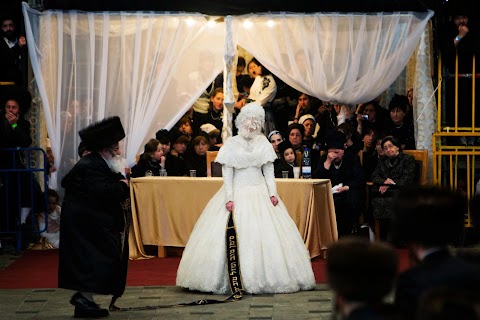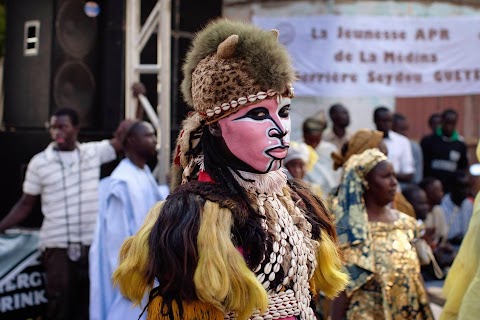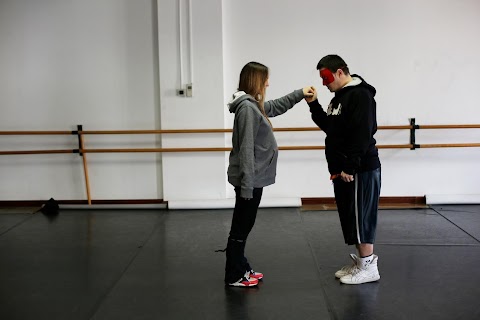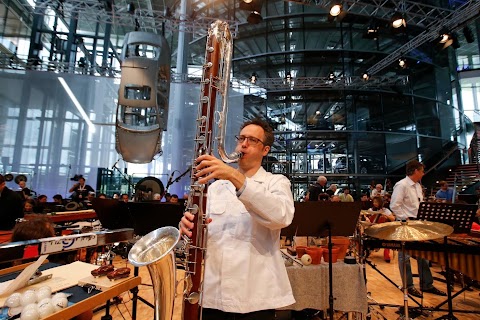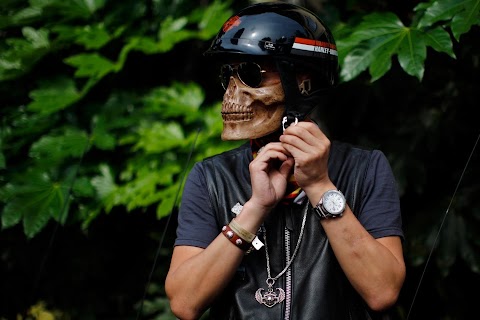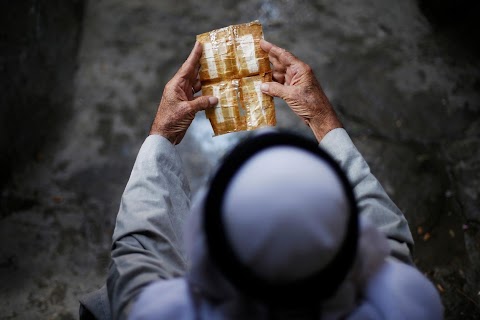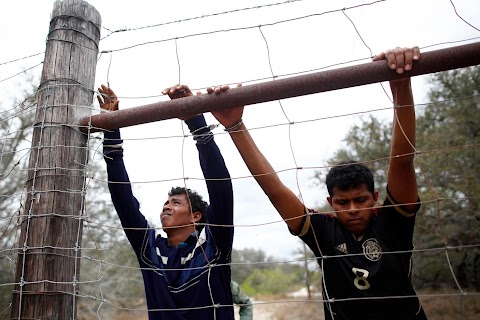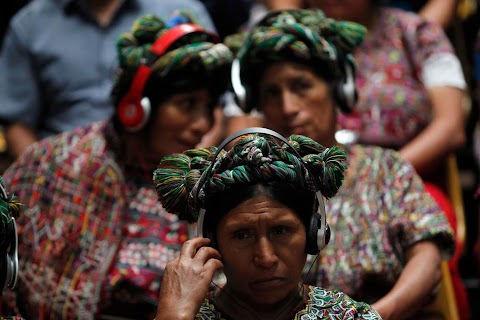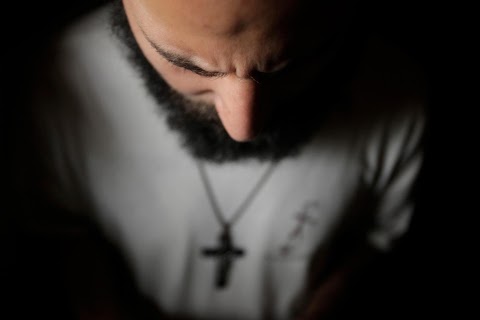
Brazil monks' message of humility
 Ricardo Moraes
Ricardo Moraes
Brother Jose Wellington Damasio Antonio, a member of the Franciscan fraternity O Caminho (The Way), prays in the chapel of group’s house in the neighbourhood of Campo Grande.
Members of O Caminho follow the teachings St Francis of Assisi, leading humble lives and helping the poor and destitute on the streets of Rio de Janeiro.

Brother Placido (left), shaves a man in the Campo Grande neighbourhood, while other homeless people lie in the street.
Members of the order consider the election of Pope Francis, the first pontiff to take the name of St Francis of Assisi, to be a confirmation of their beliefs in poverty and simplicity.

Brothers of the fraternity prepare breakfast in their kitchen. The members of O Caminho live in two houses, one for the sisters and one for the brothers, in Campo Grande about 50 kms (31 miles) from the centre of Rio.
Slideshow

Alexandre da Silva (left), who is homeless and lives with the brothers of O Caminho, watches as brothers Jose Wellington Damasio and Felipe Lima pray.

Paulo Fernandes, who has lived with the group for two months, sits outside the order’s house.

Elaine dos Santos (right), who is homeless and lives with the sisters of O Caminho, receives a hug from a nun after early morning prayers.

Brother Marcos Martins cleans a bathroom at the fraternity's house.

Jose Wellington Damasio (left) and Antonio pray in the kitchen before breakfast.

Brothers Placido (left) and Jose Wellington Damasio kneel in prayer.

Brother Placido (left) prays in a chapel while an apprentice member of the order, Leanderson, rests in another room.

Brother Glaudio plays a guitar in the chapel at the Franciscan group’s house.

Members of O Caminho; Renata Florencio, Palloma Barradas, and Juliana Santos (left to right), receive their habits upon reaching the level of "aspirant”.

Dayane Ervencio, Lidiane Pereira, and Juliana Santos (left to right), kneel in prayer during a mass.

Lidiane Pereira (right) cries, after reaching the level of "aspirant", during a service at O Caminho’s chapel.

Two members of O Caminho attend a mass to mark 100 days until World Youth Day, in the Metropolitan Cathedral. Pope Francis will attend the celebrations, which will be held in Rio during July.

Sister Juliana Santos wears a bracelet signifying her dedication to Jesus.

Members of O Caminho attend to homeless people in the Campo Grande neighbourhood.

Sister Filoteia of O Caminho cuts a homeless person's nails.

Sister Palloma Barradas talks to a person sleeping on the street.

Members of O Caminho play religious music for homeless people in the Campo Grande neighbourhood.
"As it says in the prayer of St. Francis, they are people who bring joy where there is sadness and above all, want to love more than be loved"
It was Palm Sunday in Rio’s cathedral when I found them, a small group wearing simple traditional robes, with short hair and beards, praying amidst hundreds of other Catholics. They were Franciscans, young followers of Saint Francis of Assisi, who I had seen roaming the city, almost invisible, helping Rio’s poor.
I knew nothing about them, but the election of a Latin American Pope and his choice of the name Francis interested me and I began to do some research. Franciscan orders have existed for centuries and I wanted to find out more about those youths, who one monk had described as the “Church’s rebels.”
I attended a mass, and stood observing them during an important moment, with their eyes tightly shut and very serious faces they fascinated me. I really wanted to photograph them but, with so many people around, I didn’t want to disturb the service. I waited, and when the mass finished I was able to introduce myself.
I explained that I wanted to do a photo essay about their lives, inspired by the election of Pope Francis, and asked them how they felt about the papal choice.
“It’s a confirmation of all that we believe” one of the brothers told me. With smiles, they said that I would be very welcome to visit them at their home.
The following week I went to meet the fraternity of O Caminho (The Way). The members live in two houses, one for the sisters and one for the brothers, in Campo Grande about 50 kms (31 miles) from the center of Rio. I arrived in the morning as they performed the first daily prayer. They weren’t bothered by me photographing them, and never lost concentration.
After the prayer session I was introduced to two homeless men, Paulo and Alexandre, who lived with the brothers. The Franciscans refer to the poor as “children,” or individually as “son” and “daughter,” and any who live with them are called a “favorite” son or daughter.
Brother Jose Damasio, 29, who had been a member of the fraternity for just a year, asked about my work and was anxious to know if I could write about the group’s ambitions. He explained that their dream was to have a farm where they could help the poor and drug addicts.
The Franciscans had breakfast together and got ready for the first pastoral activity of the week - offering haircuts and grooming to the homeless in the city center. Well equipped with gloves and disposable razors, the fraternity began their work.
“It takes the love of God to do something like that”, commented an elderly woman who stopped to watch the group.
As the Franciscans worked, brother Jose talked to me about the fraternity’s other missions, helping prostitutes and prisoners. He explained that it’s important to show the “children” affection, and that sometimes the group would sleep on the streets to keep them company. I thought that could be a great picture story, but I learned that the Franciscans stopped staying on the streets overnight after several violent incidents when crack addicts and vigilantes attacked the homeless.
The last day I spent with the group was a night-time round to take food to the “children”. After walking a few miles with a pot of soup and bread, we reached a garden where there were several homeless people. Sister Clara, 21 years old and always smiling, helped one of the homeless “sons” light a bonfire to cook some fish that he had acquired. After serving soup, the Franciscans sat to chat and take turns playing guitar. Sister Clara, very naturally and with affection, sat with a “daughter” who was trying to sleep, and sang religious songs along with brother Placido.
“This is our Nazareth, and what we do is live as Jesus lived for 30 years of his life” brother Antonio explained. “We live an ordinary life, a simple life, there is nothing extraordinary in our lives.”
After saying goodbye to the group I thought about everything I had experienced with them. Seeing how they acted with the poor on their missions made me happy. Nothing was premeditated, nothing was about their egos, or using their religion for personal satisfaction.
They live ordinary lives motivated by brotherly love. As it says in the prayer of St. Francis, they are people who bring joy where there is sadness and above all, want to love more than be loved.
